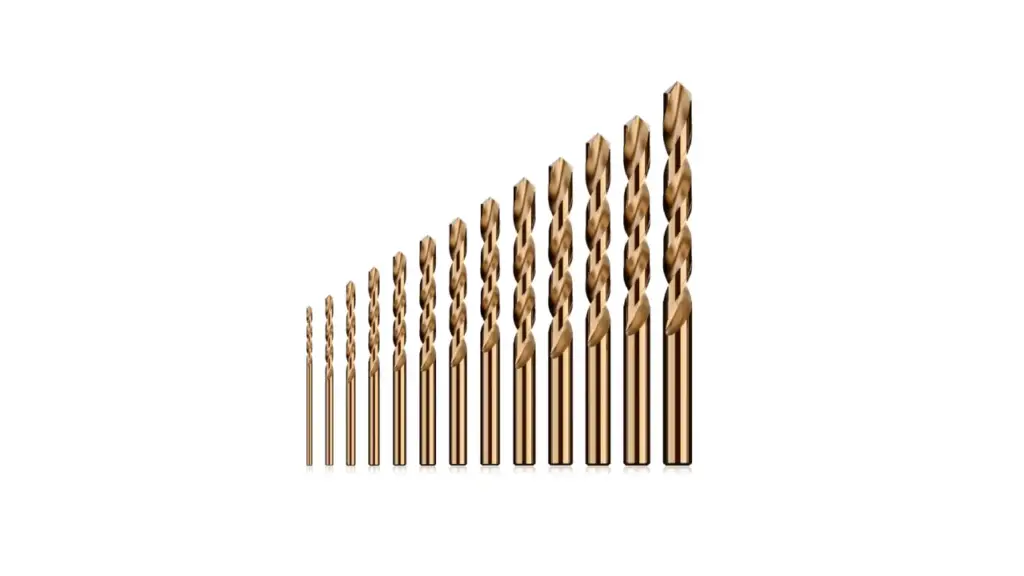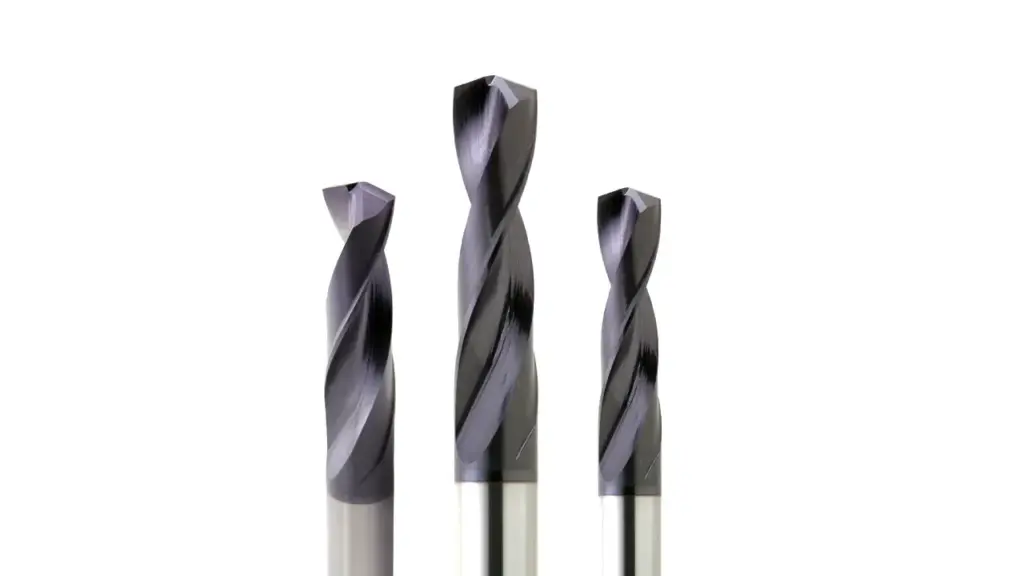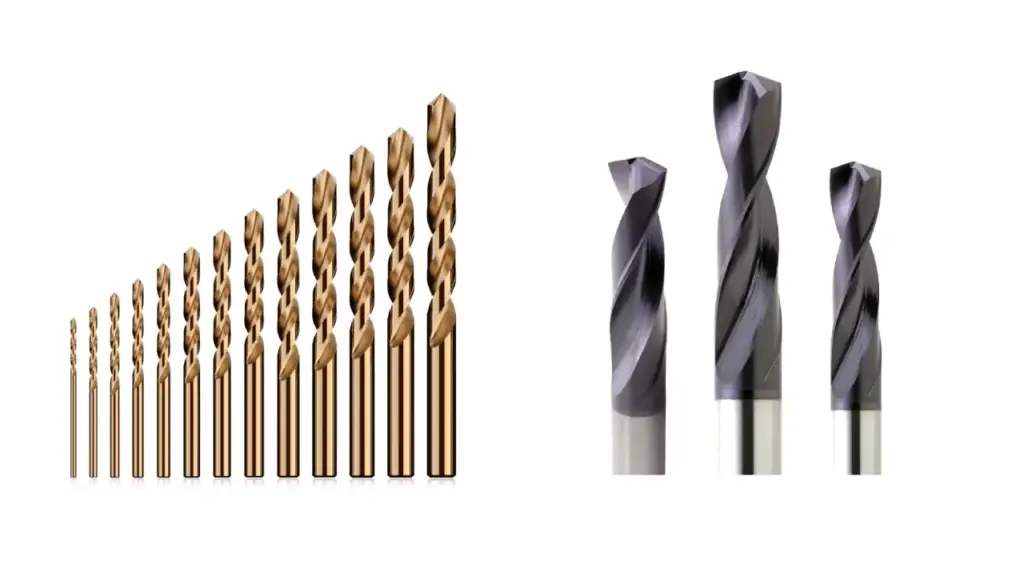When tackling tough drilling tasks, the choice of drill bit can significantly impact efficiency and the final result. Two popular options for demanding applications are cobalt and carbide drill bits. Both are engineered for durability and performance in challenging materials, but they achieve this through different compositions and designs.
Understanding the fundamental differences between cobalt and carbide drill bits is crucial for selecting the optimal tool for your specific needs, ensuring both effectiveness and longevity.
What are Cobalt Drill Bits

Cobalt drill bits are a type of high-speed steel (HSS) drill bit that has been alloyed with a specific percentage of cobalt, typically ranging from 5% to 8%. This addition of cobalt significantly enhances the bit’s inherent hardness, strength, and, most importantly, its resistance to heat.
The superior heat resistance allows cobalt drill bits to maintain their cutting edge sharpness even when drilling at higher speeds and through tough materials like stainless steel, cast iron, and hardened alloys, where standard HSS bits would quickly dull or fail. While they come at a higher cost than regular HSS or titanium-coated bits, their extended lifespan and ability to tackle challenging materials make them a valuable tool for demanding drilling applications.
What are Carbide Drill Bits

Carbide drill bits feature cutting tips or inserts made from extremely hard carbide, a compound typically composed of tungsten carbide and cobalt. This material exhibits exceptional hardness and abrasion resistance, far surpassing that of high-speed steel (HSS).
As a result, carbide drill bits are particularly well-suited for drilling through very hard and abrasive materials such as concrete, ceramic tile, fiberglass, composites, and even hardened steels. While often more brittle than HSS, their superior hardness allows them to maintain a sharp cutting edge for extended periods in demanding applications, often requiring specialized drilling techniques like rotary hammering for masonry.
Cobalt vs Carbide Drill Bits

Choosing the right drill bit is essential for efficient and effective drilling, especially when working with hard or abrasive materials.
Cobalt and carbide drill bits stand out for their exceptional performance in demanding applications, but they differ significantly in their material composition, optimal uses, and overall characteristics. Understanding these differences is crucial for selecting the best bit for your specific drilling needs.
Material Composition
Cobalt drill bits are constructed from high-speed steel (HSS) that has been alloyed with cobalt, typically ranging from 5% to 8%. This addition of cobalt throughout the bit’s structure significantly enhances its hardness and, crucially, its resistance to the high temperatures generated during drilling. This alloying process ensures that the bit retains its hardness and cutting ability even under demanding conditions, making it suitable for tough metals.
Carbide drill bits, on the other hand, feature cutting edges or inserts made from carbide, a composite material. Carbide is typically composed of tungsten carbide particles bonded together by a metal binder, usually cobalt (though in a much smaller proportion and used differently than in cobalt drill bits). This composition results in a material with exceptional hardness and abrasion resistance, far exceeding that of HSS. The carbide is often brazed or otherwise attached to a steel shank, as solid carbide bits can be brittle, especially in larger diameters.
Performance and Application
Cobalt drill bits excel in drilling hard metals such as stainless steel, cast iron, and titanium alloys. Their superior heat resistance allows them to maintain a sharp cutting edge at high speeds and under heavy feed pressure, resulting in clean holes and extended tool life in these challenging materials. They are commonly used in metalworking, machining, and construction where tough metals are frequently encountered.
Carbide drill bits are designed for drilling extremely hard and abrasive materials. Their exceptional hardness makes them ideal for applications such as drilling through concrete, ceramic tile, stone, and even hardened steels. Carbide bits are often used in conjunction with rotary hammer drills for masonry drilling. While they can drill some metals, they are generally less suited for ductile metals than cobalt bits due to their brittleness and tendency to chip under high torque or vibration.
| Feature | Cobalt Drill Bits | Carbide Drill Bits |
| Material | HSS alloyed with 5-8% Cobalt | Tungsten Carbide bonded with a metal binder (often Cobalt) |
| Hardness | High | Extremely High |
| Heat Resistance | Excellent | Very Good |
| Toughness | Good | Lower (more brittle) |
| Abrasion Resistance | Good | Excellent |
| Best For | Hard metals (stainless steel, cast iron) | Very hard, abrasive materials (concrete, tile, stone) |
| Drilling Action | Cutting | Cutting or Crushing (with hammer action) |
| Cost | Higher | Higher to Very High |
Tungsten Carbide Drill Bits vs Cobalt
Tungsten carbide and cobalt drill bits represent high-performance options for drilling, but they cater to different demands based on their material properties. Tungsten carbide bits are known for their exceptional hardness, making them ideal for very abrasive materials. Cobalt bits, while also hard, offer a better balance of hardness and toughness, excelling in drilling tough metals where heat resistance is crucial.
Hardness and Material Applications
Tungsten carbide drill bits boast significantly higher hardness compared to cobalt drill bits. This extreme hardness allows them to effectively cut through very abrasive materials such as concrete, ceramic tile, stone, hardened steel, and even fiberglass composites. Their rigidity helps maintain hole diameter accuracy, especially in demanding production settings. However, this high hardness also makes them more brittle and susceptible to chipping or breaking if subjected to lateral forces or vibrations, making them less forgiving in handheld applications or unstable setups.
Cobalt drill bits, made from a high-speed steel alloyed with cobalt, offer excellent heat resistance and a good level of hardness, though not as extreme as tungsten carbide. This combination makes them particularly well-suited for drilling tough metals like stainless steel, cast iron, titanium, and tool steels, where significant heat is generated. Their greater toughness compared to carbide means they are less likely to fracture under stress, making them a more forgiving option for handheld drilling and situations where the drill setup might not be perfectly rigid.
Drilling Speed and Wear Resistance
Tungsten carbide drill bits can operate at significantly higher drilling speeds compared to cobalt drill bits, especially when used in rigid, controlled environments like CNC machines. Their superior wear resistance allows them to maintain a sharp cutting edge for extended periods, leading to increased productivity in high-volume applications. Furthermore, some carbide drills support through-tool coolant, which aids in heat dissipation and chip evacuation at these high speeds, eliminating the need for pecking.
Cobalt drill bits, while also offering good wear resistance, cannot typically achieve the same high drilling speeds as carbide bits. They are more prone to wear at very high speeds, especially in harder metals, and often require the use of cutting fluids or cool-down periods to manage heat buildup effectively. However, their ability to be resharpened multiple times without losing their core properties makes them a cost-effective solution for many metalworking tasks, especially in smaller workshops or for varied, non-continuous drilling.
Cost and Application Environment
Tungsten carbide drill bits generally have a higher initial cost compared to cobalt drill bits, especially solid carbide versions. Their specialized manufacturing process and the cost of tungsten carbide material contribute to this higher price point. They are often favored in industrial and manufacturing settings where high precision, speed, and prolonged tool life are critical, and where rigid machinery minimizes the risk of breakage.
Cobalt drill bits, while more expensive than standard HSS bits, are typically more accessible and less costly than solid carbide options. Their versatility and relative toughness make them a popular choice for a wide range of users, from professional machinists to serious DIY enthusiasts. They perform well in drill presses and can also be used cautiously in handheld drills, offering a good balance of performance and value for drilling tough metals.
Cobalt vs Carbide Drill Bits for Steel
When drilling into steel, both cobalt and carbide drill bits offer advantages depending on the specific type and hardness of the steel, as well as the demands of the task. Cobalt drill bits, made from high-speed steel alloyed with cobalt, excel in drilling harder steels like stainless steel and tool steel due to their superior heat resistance.
They maintain their sharpness at higher temperatures, which is crucial when working with these tough metals. Additionally, cobalt bits offer a good balance of hardness and toughness, making them less prone to chipping than carbide in some applications.
Carbide drill bits, with their tips made from extremely hard tungsten carbide, are the superior choice for very hard and abrasive steels, such as hardened steel and some high-strength alloys. Carbide’s exceptional hardness allows it to cut through these materials more effectively and maintain an edge for a longer period. However, carbide is also more brittle than cobalt and can be prone to chipping or breaking if not used with a rigid setup and proper technique. Carbide drill bits often perform best at higher speeds and lower feed rates.
Here’s a breakdown to help you choose:
- Hardened Steel (48-65 Rockwell C): Carbide-tipped or solid carbide drill bits are generally recommended due to their extreme hardness.
- Stainless Steel & Tool Steel: Cobalt drill bits are often preferred for their heat resistance and ability to maintain sharpness. Carbide can also be used but requires a very stable setup.
- Mild Steel: Both cobalt and high-quality carbide can be used effectively. Cobalt offers good heat resistance, while carbide provides excellent wear resistance.
- Production/High Volume: Carbide drill bits can offer faster cutting speeds and longer tool life in automated setups where rigidity is high.
- Manual Drilling/Less Rigid Setups: Cobalt drill bits might be more forgiving due to their better toughness.
How to Choose Cobalt and Carbide Drill Bits
Selecting the appropriate cobalt or carbide drill bit hinges on the fundamental properties of the material you intend to drill. Cobalt drill bits are generally the preferred choice for tasks involving hard and tough metals, such as stainless steel, cast iron, titanium alloys, and tool steels.
Their inherent heat resistance, a result of the cobalt alloy in the high-speed steel, allows them to maintain a sharp cutting edge even under the high temperatures generated when working with these demanding materials. The good toughness of cobalt also makes it less prone to fracturing under the stress of drilling hard metals, offering a balance of hardness and durability for effective material removal.
Conversely, carbide drill bits are superior when dealing with hard and abrasive materials like concrete, ceramic tile, stone, fiberglass, composites, and even hardened steels. Their exceptional hardness and abrasion resistance, stemming from the tungsten carbide composition, enable them to effectively cut or grind through these challenging materials where HSS-based bits would quickly dull. However, the higher brittleness of carbide means they perform best in rigid setups with minimal vibration and are often used with rotary hammering action for masonry.
Consider these factors when choosing between cobalt and carbide drill bits:
- Material Hardness and Abrasiveness: For tough metals, choose cobalt. For very hard, abrasive materials like concrete or tile, select carbide.
- Heat Generation: Drilling hard metals generates significant heat; cobalt’s heat resistance is crucial. Abrasive materials can also generate heat, but carbide’s wear resistance is the primary benefit.
- Drilling Action: Cobalt bits are primarily for cutting. Carbide bits can cut or grind, and are often used with the hammering action of a rotary hammer for masonry.
- Drill Setup Rigidity: Carbide bits are more brittle and require a stable setup to avoid breakage. Cobalt bits are more forgiving.
- Drilling Speed and Feed Rate: Carbide can often handle higher speeds on appropriate materials, especially in controlled environments. Cobalt performs well at moderate speeds with consistent feed.
- Cost: Carbide drill bits are generally more expensive than cobalt drill bits.
- Longevity: For their intended materials, both can offer long lifespans, but using the wrong bit will lead to premature failure.
Conclusion
Cobalt drill bits excel in drilling hard metals due to their superior heat resistance and toughness, making them ideal for materials like stainless steel. Carbide drill bits, with their extreme hardness, are best suited for very abrasive materials like concrete, tile, and hardened steel, often in high-speed, low-feed applications.
While cobalt bits offer a good balance of hardness and toughness for metalworking, carbide bits provide exceptional wear resistance for specialized drilling tasks. The choice between them depends heavily on the primary materials you intend to drill and the demands of your projects.
When sourcing wholesale drill bits from us, consider stocking both cobalt and carbide options to cater to a wide range of drilling needs. Cobalt will appeal to metalworkers, while carbide will attract those working with masonry and exceptionally hard materials.


